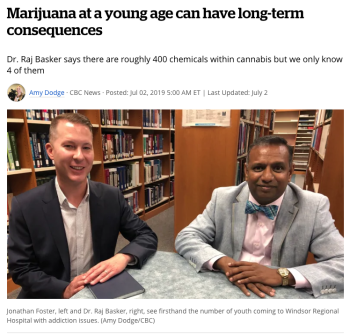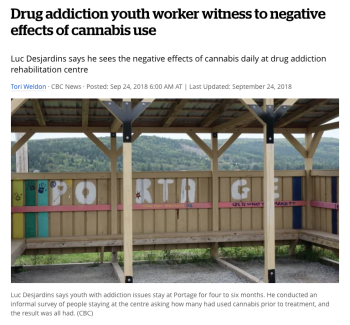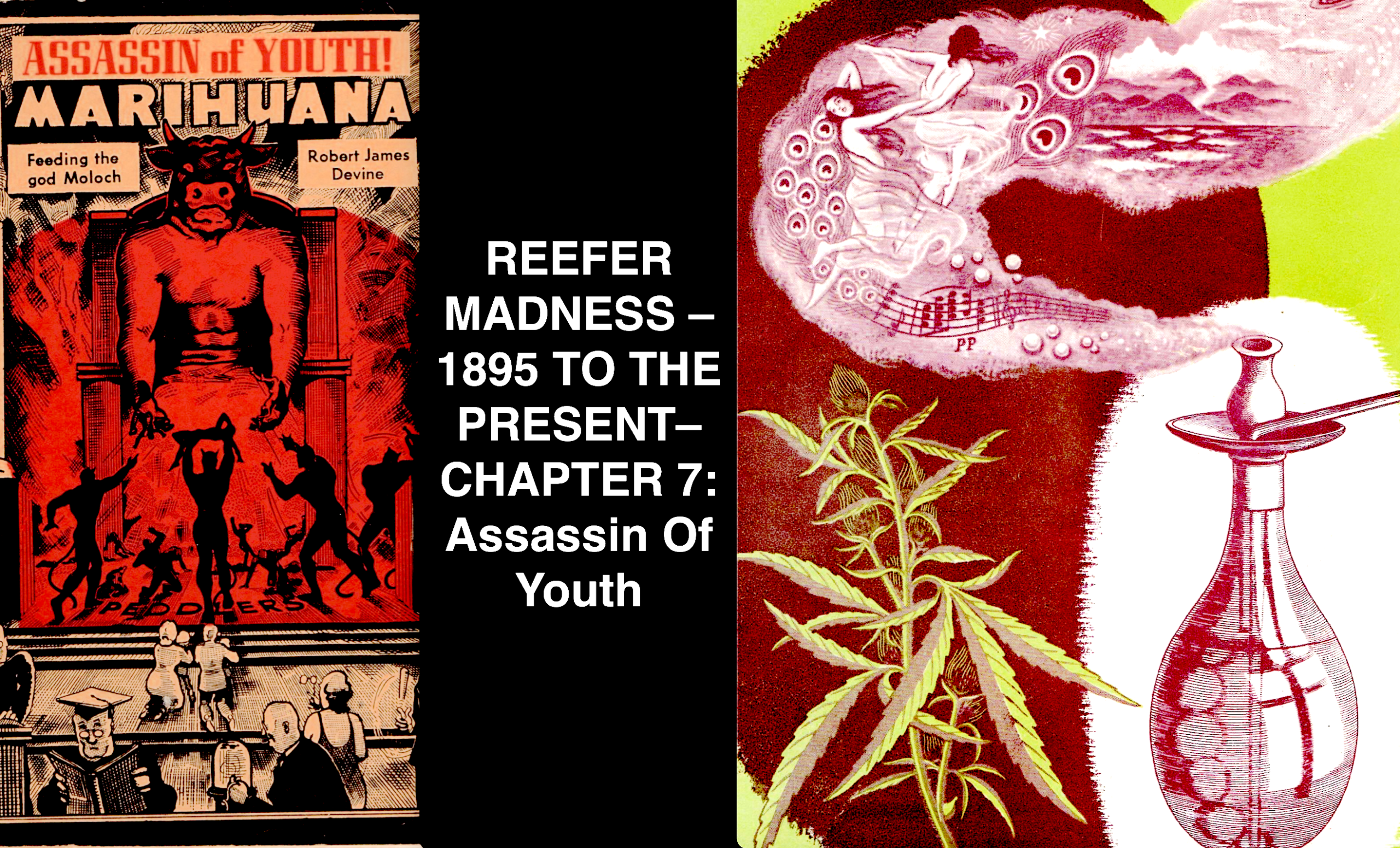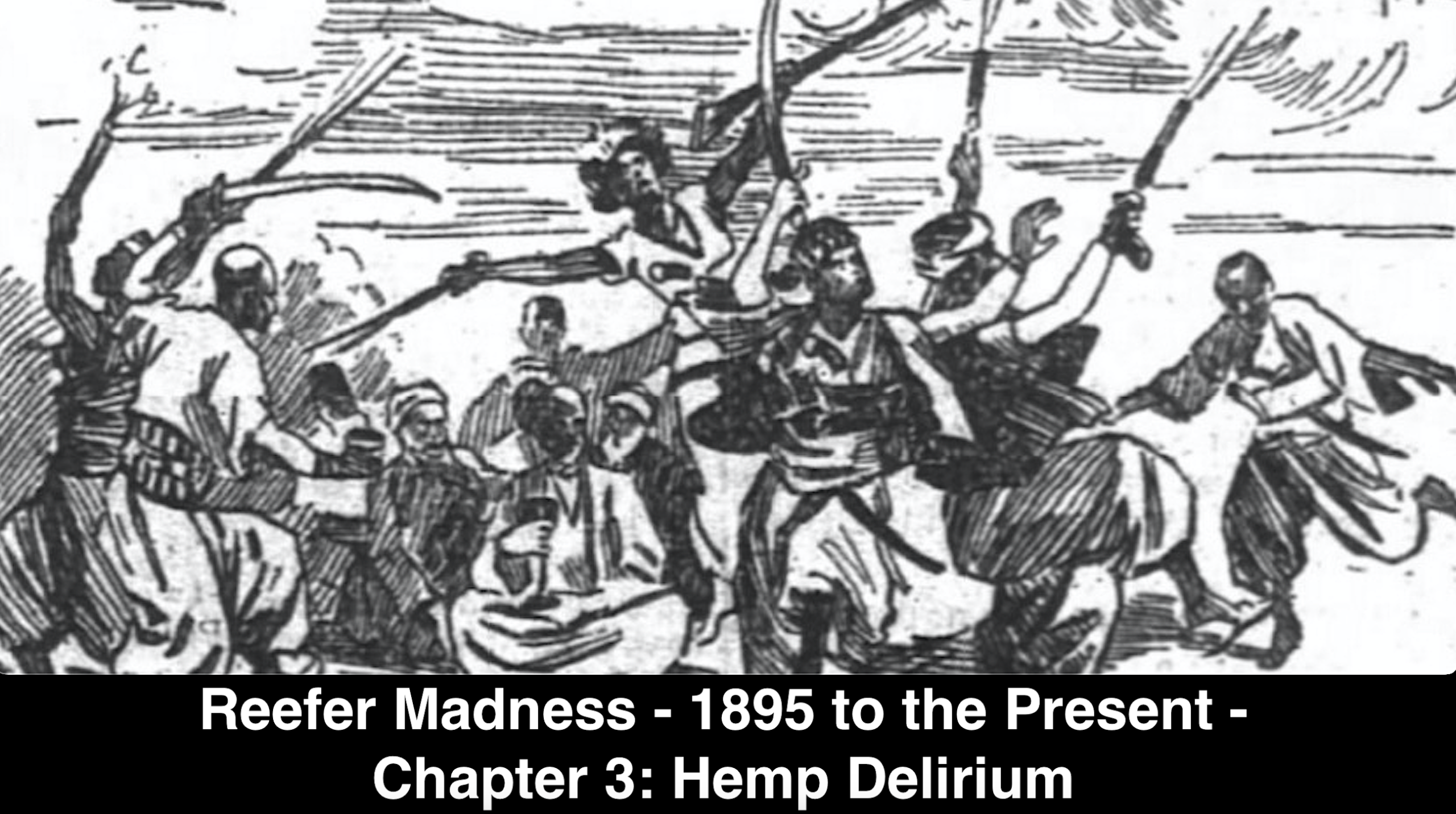Fake News Coming from CBC on Cannabis and Teens – Can Anything Be Done About It?
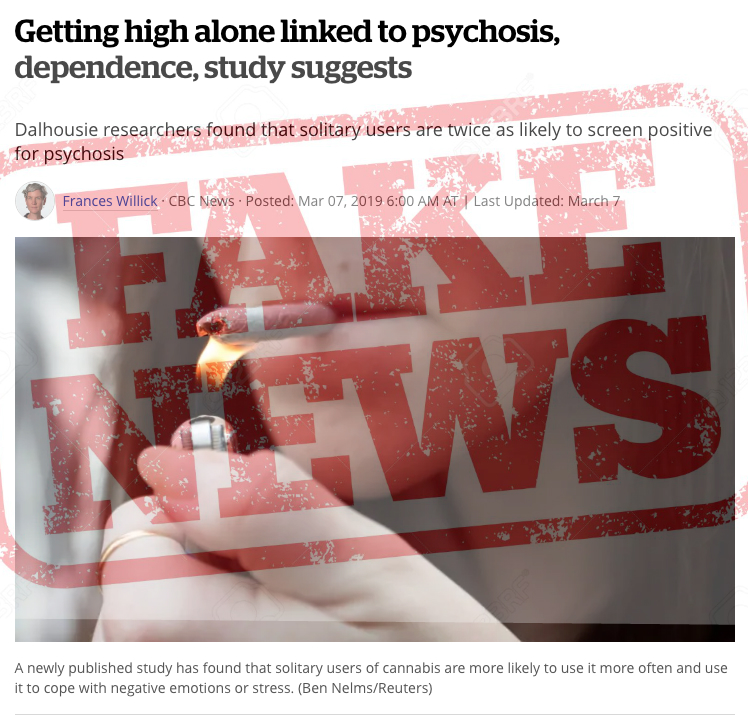
CANNABIS CULTURE – Back in early July of 2019, I read a series of stories about how to spot “fake news” from the CBC website:
https://www.cbc.ca/news/technology/fake-news-misinformation-online-1.5196865
https://www.cbc.ca/news/technology/fake-news-disinformation-propaganda-internet-1.5196964
This topic seems to be a favorite of the reporter Andrea Bellemare, who keeps writing about it:
https://www.cbc.ca/news/politics/india-fake-news-sites-canada-1.5366591
I wrote to Andrea, and expressed my concern with CBC and their “fake news” about how cannabis makes kids stupid and crazy. This fake news was the justification the new millionaire pot cartel used to justify it’s privilege, and how the over-regulation of industrial hemp was maintained. I had evidence to the contrary, and have shared it repeatedly with the CBC:
2015: Edited out of this video at approximately 5:35 of the video: https://www.youtube.com/watch?time_continue=335&v=coUcREiAyUw&feature=emb_logo
2016: At 1:30 of the video at the top of this page: https://www.cbc.ca/news/politics/india-fake-news-sites-canada-1.5366591
A CBC panel discussion on cannabis and teens called “4:19” took place on April 19th, 2018 – a day before the high holiday of the cannabis community, April 20th.
Assembled were all the experts CBC could round up to defend both the new proposed laws and the notion that cannabis harmed the developing mind. I asked the following question:
“Why won’t you address the general population statistics or provide a realistic cost-benefit analysis of cannabis use – and I’ll explain what I mean by that. The general population statistics indicate that psychosis remains steady – at one or two percent – in western societies, and IQ’s go up every year – it’s called the Flynn Effect – but cannabis use rates have skyrocketed since the 1960s. If it actually made our kids stupid or crazy, you’d see IQ rates go down and psychosis rates go up – but we don’t see that. And when I talk about a cost-benefit analysis, I’m talking about: ‘Do you actually care what teens are dying from?’ Because it’s not pot – it’s nothing to do with pot. Teens are dying from suicides, car crashes, and alcohol and opioid overdoses. And cannabis – if it was like the Senate recommended in 2002 – if teens had access to safe places to smoke we could reduce those deaths. Why won’t you address that?”
https://www.cbc.ca/news/canada/british-columbia/events/419-1.4607491
The CBC had the entire meeting videotaped and at one time it was posted it online.
https://www.facebook.com/VancouverCBC/videos/1737816546255892/
Malmo-Levine’s question was at the point in the video where there was 19 minutes left in the event. It has since been taken down, but in that video you can see their experts try and focus on one aspect of what Mr. Malmo-Levine said – that pot use rates have skyrocketed since the 1960s – they then focus on the fact that use rates decreased a bit after the 1990s – but ignore the fact that use rates went up from the 1960s to the 1990s and they don’t talk about IQ rates or psychosis rates at all.
Having been ignored for all these years, while this new “reefer madness 2.0” lie has been used as a weapon against young users and poor growers and dealers, it made me frustrated to see the CBC talk about how other media entities were spreading “fake news” while it did the same thing. So when I asked Andrea if anything could be done about the CBC’s fake news, she said I should contact the ombudsman. So I did. This is the correspondence, unedited. If you don’t believe me … if anyone wants to see screenshots of the actual correspondence, just email me at [email protected] and I will send it to you.
|
Jul 8, 2019, 5:40 PM | ||||||||
|
|||||||||
Dear Jack Nagler, CBC Ombudsman,
I found more recent examples of non-factual reporting on cannabis and young people:
https://www.cbc.ca/news/health/cannabis-depression-adolescents-1.5017459
https://www.cbc.ca/news/politics/edibles-legalize-cannabis-rules-1.5175689
https://www.cbc.ca/news/health/cannabis-edibile-pediatric-1.5191501
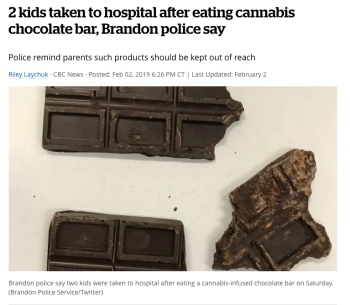 https://www.cbc.ca/news/canada/manitoba/kids-hospitalized-cannabis-overdose-brandon-1.5003878
https://www.cbc.ca/news/canada/manitoba/kids-hospitalized-cannabis-overdose-brandon-1.5003878
https://www.cbc.ca/news/canada/toronto/youth-cannabis-memory-study-1.4884846
Your standards page offers this as a CBC standard:
Impartiality
We provide professional judgment based on facts and expertise. We do not promote any particular point of view on matters of public debate.
But the fact of the matter is that none of the reporting the CBC has done in the last 12 months has reflected the fact that the “developing minds of young people” are not harmed by cannabis use because those harms don’t show up in the general population statistics, which are more resistant to researcher bias than the studies relied upon by the experts selected by CBC reporters.
Furthermore, when a story appears about kids overdosing on cannabis edibles, the context is always missing: there is never any permanent harm, and tide pods (which do result in permanent harms) are 35 times more likely to result in hospitalization:
We have seen the effects of continued prohibition enforcement of cannabis laws on teens in the USA post legalization – which disproportionately harms non-white youth, and may account for the “cannabis-related depression” that may in fact be “prohibition-related depression” experienced by those left out of legalization:
http://pot-facts.ca/pot-arrests-of-black-youth-went-up-after-pot-legalization-in-colorado/
The vast majority of teens are not harmed by cannabis use – and the ones who are could be taught to use cannabis properly instead of punished for misuse:
http://pot-facts.ca/cannabis-harm-reduction-concepts-are-not-difficult-to-understand/
Teens happen to be dying from three things, mainly: suicide, car crashes and drug and alcohol overdose:
The CBC, by failing repeatedly to point out the factual context of the discussion over mitigatable, imaginary or outright fraud-based teen cannabis harms and real, actual, not-imaginary cannabis prohibition-related harms, are failing the teens of Canada and the rest of the world by failing to look out for their interests.
And by promotion of this mythology, other harms are created: 1) the over regulation of industrial hemp, which itself results in harm to the environment, and 2) the cartelization of the cannabis economy, which results in less wealthy cannabis growers and dealers having to choose between wage slavery or incarceration.
I am not concerned with the motivations of the various reporters who spread non factual info – my goal is not to punish anyone but to get it to stop happening – so I think it’s a waste of time to try and figure out if it’s disinformation or misinformation. I use the term fake news because it’s a popular term, used in the title of both of Andrea’s articles on the subject for the same reason she used them, presumably: to get attention.
The remedy seems to be putting the relevant facts that debunk the myths in as prominent a place and with the same frequency as the myths appeared. If you bother to check, the CBC has done literally hundreds of stories about cannabis and youth over the years, and 99% of them have been misleading. A very prominent, impossible-to-ignore correcting of the record is required to make this right.
Sincerely,
David Malmo-Levine
I should like to add that, if the Senate Report’s recommendation that 16 year olds would be allowed to purchase and smoke cannabis in the legal market at a safe consumption site were implemented, the suicides, car crashes and opioid/alcohol overdose deaths actually experienced by teens might have the ability to be addressed:
http://pot-facts.ca/experts-have-recommended-that-16-be-the-age-limit-to-buy-cannabis/ Wed, Jul 10, 7:28 AM |
|||||||||||||||||||||||||
|
|
|||||||||||||||||||||||||
I should like to add that, if the Senate Report’s recommendation that 16 year olds would be allowed to purchase and smoke cannabis in the legal market at a safe consumption site were implemented, the suicides, car crashes and opioid/alcohol overdose deaths actually experienced by teens might have the ability to be addressed:
http://pot-facts.ca/experts-have-recommended-that-16-be-the-age-limit-to-buy-cannabis/
| from: | CBC Ombud <[email protected]> |
| to: | David Malmo-Levine <[email protected]>
|
| cc: | Jennifer McGuire <[email protected]>
|
| date: | Jul 22, 2019, 7:25 AM |
| subject: | Re: Fake news coming from CBC on cannabis and teens – can anything be done about it? |
Dear Mr. Malmo-Levine:
I write (belatedly) to acknowledge receipt of your email. I have shared it directly with Jennifer McGuire, General Manager and Editor in Chief of CBC News, along with the request that she address your concerns about CBC’s coverage of cannabis and youth.
Programmers are asked to try to respond within twenty working days.
Sincerely,
Jack Nagler
CBC Ombudsman
| from: | David Malmo-Levine <[email protected]> |
| to: | CBC Ombud <[email protected]>
|
| cc: | Jennifer McGuire <[email protected]>
|
| date: | Aug 12, 2019, 10:09 AM |
| subject: | Re: Fake news coming from CBC on cannabis and teens – can anything be done about it? |
Dear Jack and Jennifer,
Regarding the response from you: Was that 20 working days from when I submitted the evidence of the promotion of a narrative that was designed to eliminate herbal autonomy from Canada (July 10th) or was that 20 working days from when you passed my concerns on to Jennifer? (July 22nd). I’m not sure what a working day is anymore – I’ve been off the 9-5 grid for quite some time – and I’m not sure how many holidays are involved or even if the CBC is interested in responding at all.
I’m just checking in, because I was going to write something about it and put it online but I thought it would be best to check back with you guys and see if you had a comment before I proceeded. I’m hoping you can see the evidence for what it is, and find some way to balance all the misinformation with the facts featured more prominently. My entire community of poor pot growers and dealers and young users are depending on you to do so – they don’t want any more pot prohibition, because it’s hurting them. Raids are sometimes deadly, and these people have used cannabis as an income for generations, and fines take away food money, and jail time destroys relationships and lives.
Speaking of which, did you see this injustice?
Or this one?
Or this one?
We shall see more and more of these injustices until the media corrects the misinformation. But you keep spreading it – in spite of overwhelming evidence that this is not the case:
“The CAQ has justified its tougher approach to cannabis by citing studies that question the drug’s long-term impact on young peoples’ mental health.”
https://www.cbc.ca/news/canada/montreal/cannabis-regulations-quebec-legal-1.5223723
“What we know from reading hundreds of studies, there is an association between cannabis use and mental health, but what we don’t know is about causation,” she said.
https://www.cbc.ca/news/canada/calgary/cannabis-mental-health-study-1.5231900
That last statement was an out-and-out lie. We DO know that there’s no causation, because none of the general population stats anywhere in the world have shown an increase in psychosis or a decrease in IQ. If there were causation, it would show up somewhere in the gen pop stats. I can walk you through the studies again if you like. Or I can point to the same lie throughout the last 125 years of cannabis history. It was debunked in the Indian Hemp Drug Commission report of 1895, the LaGuardia report of 1944, the LeDain Report and the Shafer reports of 1972, the Senate Report of 2002 and, more recently, in all of these reports here:
This reefer madness lie is the same lie that has provided justification for the persecution of the pot people for 125 years. From the book I’m currently writing on the subject. 125 years of the same lie is quite enough:
In 1893, the first attempt at establishing a “reefer madness” theory in the public mind by a government took place. But they didn’t call it “reefer madness” – they called it “ganja mania”. The word “ganja”, of course, is Hindi for “sensimilla” or “seedless buds” – in other words, high quality marijuana. (49) In that year, the British Government appointed the Indian Hemp Drugs Commission – empowered to investigate, amongst other things, a reported “high incidence” of ganja-related mania in Indian lunatic asylums. (50) What they found, however, was that it was an ordinary practice “to enter hemp drugs as the cause of insanity where it has been shown that the patient used these drugs” and that, in many cases, the “cause of insanity” was automatically changed from “unknown” to “ganja smoking”. (51)
49) “History of cannabis as a medicine”, Ethan Russo, in The Medicinal Uses of Cannabis and Cannabinoids”, 2004, Edited by Geoffrey Guy, Brian Whittle and Philip Robson, Pharmaceutical Press, London, p. 9
50) Vera Rubin, Lambros Comitas, Ganja In Jamaica, 1976, Anchor Books, Garden City, NY, p. 17
51) Ibid, p. 19, see also Report of the Indian Hemp Drugs Commission 1893-94, Volume 1, Hardinge Simpole, National Library of Scotland, 1894 (2010 edition), p. 232: “Finally, the distrust of the descriptive roll must be further intensified by the consideration of the pressure brought to bare on subordinates to supply information as to cause. An illustration of this may be found as early as 1863 in the Resolution of the Government of Bengal on the Asylum Reports for 1862. And a striking illustration of the effect of this pressure is found in the Dullunda Asylum returns for the following year (1863), in which the cause in several cases dating from the year 1857 and onwards was altered from ‘unknown’ to ‘ganja smoking’.” P. 236: “Surgeon-Lieutenant-Colonel Leapingwell (Vizagapatam) says: ‘I should myself have put down ganja as the cause of insanity in any case where I examined the friends if they merely said the man used ganja and I could get no other cause, as I did not discriminate between the excessive and moderate use.’ … Surgeon-Major Willcocks, of Agra, says: ‘Ordinarily it has been the practice to enter hemp drugs as the cause of insanity where it has been shown that the patient used these drugs. I cannot say precisely why this is the practice. It has come down as the traditional practice.”
This “fake news” has been going on long enough. Cannabis is not a hard drug. It doesn’t make kids stupid or crazy. Please stop pretending it does. The facts say otherwise.
Sincerely and hopefully,
David
| from: | CBC Ombud <[email protected]> |
| to: | David Malmo-Levine <[email protected]>
|
| cc: | Jennifer McGuire <[email protected]>
|
| date: | Aug 12, 2019, 11:54 AM |
| subject: | Re: Fake news coming from CBC on cannabis and teens – can anything be done about it? |
Dear Mr. Malmo-Levine,
The 20 working days began counting as of July 22nd, when I forwarded the email to Ms. McGuire. So that makes August 20th the date to circle on your calendar. I should note that the 20-day timeline is a tradition, not a requirement – and your complaint is more complex than most. Having said that, CBC News generally works hard to stay within the guideline.
Even though you cc-ed her on your latest email, I am sharing it with her again to reinforce your desire to have a reply in as timely a fashion as possible.
Sincerely,
Jack Nagler
CBC Ombudsman
The CBC has appeared to have either forgot my concerns due to incompetence, or is too embarrassed about their incompetence regarding separating cannabis myths from cannabis facts to want to face that reality hoping that the concern will be limited to ignorable, private correspondence. Such explanations are more plausible than some cunning conspiracy to placate their pro-cartel Liberal overlords, so I choose to believe the former rather than the latter.
If you’re as disappointed with the CBC’s job of reporting accurately on cannabis risks as I am, feel free to write Jennifer McGuire, General Manager and Editor in Chief of CBC News:
| Jennifer McGuire <[email protected]>
|
– and send her the link to this correspondence and see if she responds to you – maybe if enough of us do, she will have to respond. At least she will know that people know she dropped the ball, and has failed to protect millions of Canadian growers, dealers and users from unfair stigma and scapegoating.

